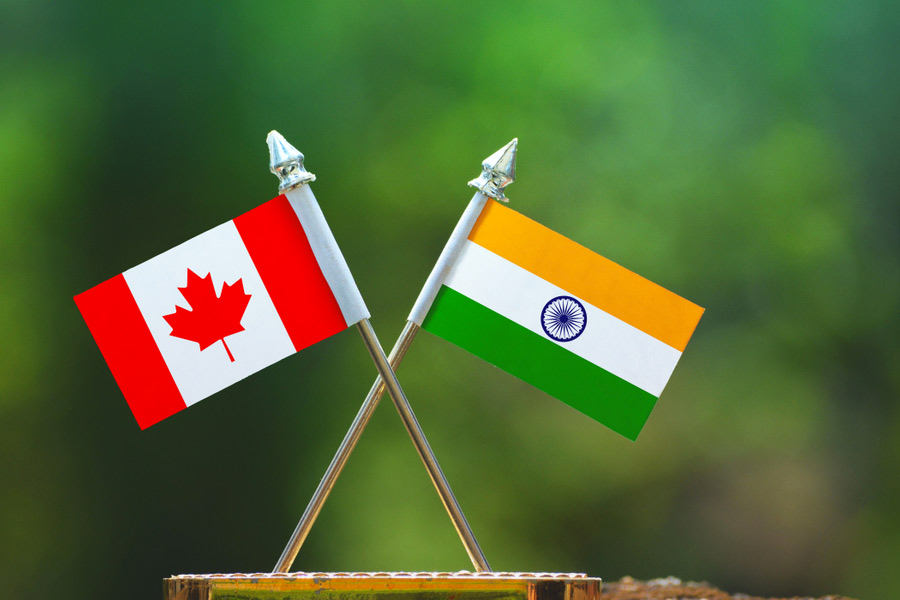On November 4, violence erupted outside the Hindu Sabha Mandir temple in Brampton, just outside Toronto, as Hindu nationalists and Sikh separatists clashed during a protest. Thousands of demonstrators gathered, leading to days of unrest across Canada and several arrests.
The confrontation stemmed from pro-Khalistan Sikhs protesting an event attended by Indian consular officials. The skirmishes, involving flagpoles and physical altercations, mark another chapter in the escalating tensions between Canada and India—a relationship already strained by allegations of Indian involvement in the assassination of Sikh separatist Hardeep Singh Nijjar in Canada.
Canada-India Diplomatic Rift: The Background
In 2023, Canadian Prime Minister Justin Trudeau alleged that the Indian government was linked to Nijjar’s assassination. Nijjar, an outspoken advocate for an independent Sikh state, Khalistan, had been labeled a terrorist by New Delhi. Indian officials vehemently denied the claims, dismissing them as baseless.
Trudeau’s accusations led to reciprocal expulsions of diplomats from both nations, including six Indian envoys in Canada. Ottawa further implicated top Indian officials, including Home Affairs Minister Amit Shah, accusing them of plotting violence against Sikh activists in Canada.
India, home to the Hindu nationalist Bharatiya Janata Party (BJP) led by Prime Minister Narendra Modi, rejected these claims and criticized Canada’s leniency toward pro-Khalistan elements. Meanwhile, Canada argued that peaceful advocacy for Khalistan does not violate its laws.
The Khalistan Movement: A Key Issue
The Khalistan movement gained momentum in the 1980s following violent crackdowns on Sikhs in India, particularly after the assassination of Indian Prime Minister Indira Gandhi by her Sikh bodyguards in 1984. While support for Khalistan has diminished in India, the movement remains active within the Sikh diaspora, especially in Canada, which hosts one of the largest Sikh communities worldwide.
India has long accused Canada of harboring extremists, citing the 1985 Air India Flight 182 bombing as an example. Canada-based Sikh extremists planted a bomb on a flight from Montreal to Mumbai, killing 329 people. The attack remains the deadliest terror act in Canada’s history and a major point of contention between the two countries.
Modi and Trudeau: A Diplomatic Deadlock
Relations between India and Canada have worsened under the leadership of Modi and Trudeau. During Trudeau’s 2018 visit to India, he faced a cold reception from Indian officials, partly due to Canada’s perceived tolerance of Sikh separatists. Tensions further escalated when a former Sikh extremist was invited to an official dinner hosted by Trudeau in India—a move widely criticized by New Delhi.
In recent months, Trudeau accused India of supporting criminal activity on Canadian soil, while India called on Canada to crack down on extremist activities. The growing mistrust between the two nations has spilled into public protests and violent incidents like the Brampton clashes.
Global Repercussions
The Canada-India dispute has drawn concern from international allies, including the United States, United Kingdom, and Australia, who rely on India as a key partner in countering China’s influence. The U.S. recently accused an Indian official of plotting to assassinate a Sikh activist in New York, a claim India denied but agreed to investigate.
Photos from the G20 summit in Brazil earlier this month showed Modi and Trudeau sharing an amicable moment with U.S. President Joe Biden, signaling efforts to maintain diplomacy despite the rift.
The Fallout of Recent Clashes
In response to the Brampton clashes, Canadian authorities arrested five individuals and suspended a local police officer involved in the protests. The city also enacted bylaws prohibiting demonstrations near religious sites. Modi condemned the violence, calling it a “deliberate attack on a Hindu temple” and urging the Canadian government to uphold justice.
Future of Canada-India Relations
Experts suggest that under the current leadership, resolving the conflict appears unlikely. With Canada’s federal elections due by October 2025, political changes may offer an opportunity for a reset. Until then, trade, security cooperation, and other areas of mutual interest risk being overshadowed by the deepening mistrust between the two nations.


